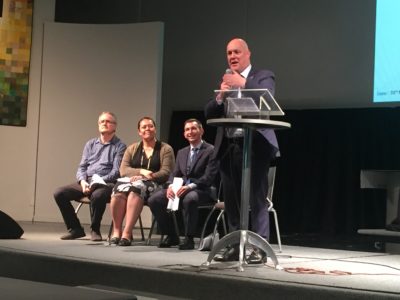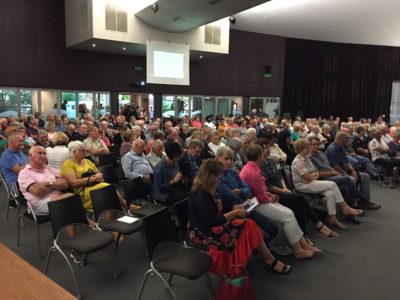
They turned up in their droves to deliver a clear message that east Auckland deserves high quality medical services – and now.
More than 400 people packed into St Columba Church in Botany on March 31 for a public meeting on the closure of East Care Accident and Medical’s overnight service and the future delivery of health care in the area.
The public meeting was hosted by Pakuranga MP Simeon Brown and Botany MP Christopher Luxon.
It gave people the chance to question Counties Manukau District Health Board (DHB) chief executive Margie Apa and chairman Mark Gosche.
Brown opened the meeting by saying he and Luxon had created a petition calling for the overnight service to be reinstated that was signed by more than 10,000 people in three days.
“I think that shows the amount of community feeling and support for that service in east Auckland and how much we relied on it in our community,” he said.
“We heard from hundreds of people who have used that service and how much it meant to them.
“That closure came as a shock and, since then, we have spoken to and engaged with the DHB.
“We met with them before Christmas and Christopher Luxon went and presented that petition.”
Apa delivered a presentation for the audience that explained how the DHB provides medical services in its area, how the community uses those services and the organisation’s plans for future health care provision.
“The Government sets for DHBs expectations of where and how much service we provide,” she said.
“Sometimes we get a bit of wiggle room to look at what we can tailor for our community because sometimes it doesn’t fit.
“This is the expectation the Government has set for us.
“We must be able to provide after-hours care within 60 minutes of travel time.
“It’s written in national contracts and it’s how funding is set, particularly for community services.
“For our district we’ve added an extra expectation.
“We actually want people to be able to access that care within their locality, so much closer to where they live.”
Apa said the DHB has not funded East Care’s overnight service since July 2018, but the Healthline medical phone service is available to everyone 24 hours a day, seven days a week.
She said it’s staffed by “clinical people who have very good protocols and pathways”.
“Also available … 24/7 [people can phone] 111 for emergencies and, of course, the emergency department at hospitals are available and open 24 hours, seven days a week.”
Audience members asked numerous questions throughout the meeting, including about access to glaucoma treatment in the area, and why east Auckland doesn’t have its own hospital given its population is of a similar size to Dunedin’s.
People also asked whether the local community would continue to lose medical services in the coming years and why it can take so long to be seen at Middlemore Hospital’s emergency department.

Luxon said he had looked at monthly data from the past five years.
He said people who present to Middlemore Hospital’s emergency department between 11pm and 7am can experience an average waiting time of up to 165 minutes.
“So this notion that we’ve got lots of capacity between 11pm-7am is not reported in the numbers,” he said.
“The second thing is it’s all great about Healthline, but at times you can be on the calls waiting for a long response before someone picks up the phone from Healthline.
“Everyone talks about how great it is but if you’re waiting a long time, during the Covid crisis people were waiting up to three, five, seven hours, so that’s not what you want in an emergency situation.
“I get all the ‘stuff’, but the reality is for $300,000 to $500,000, why don’t you just fund the [overnight] service and put it back in place?”
His question was addressed by Dr Vanessa Thornton, clinical director of Middlemore Hospital’s emergency department (ED), who was among the medical staff at the meeting.
She said patients at the hospital’s ED would always wait “for some time period” unless they were classed as category one or two.
“We see a lot of category one and two. They are high-acuity [severity].
“So we will see you, if you come in with a significant or life-threatening condition, very quickly.
“That is what emergency departments are for.
“Otherwise you will be seen by a nurse within 20 minutes and you will have your treatment started.
“You may not be seen by a doctor, and this is a measure made by the Government, and we stick purely to this, other DHBs don’t, for 167 minutes.
“But if that nurse thinks you are more urgent when she sees you, you will be categorised ahead of the other triage patients.
“So it is a system of putting people in a line of urgency and acuity.”
Gosche said a review would soon be held into where and how the DHB spends the Government funding it receives.
“The review is about to kick in on whether we alter what we’re doing.
“We’re at the three-year mark and we’re going to have an independent outfit come in and review it.
“Then we will consider what we do with the pool of money and where it’s placed.”
He encouraged the audience to put together a group of residents to engage with the DHB on “what are the [medical] services, where they should be, and what should they look like” in the local community.
“If we can work through that together rather than leave it to us to do that all on our own, that is much better in our experience.”










